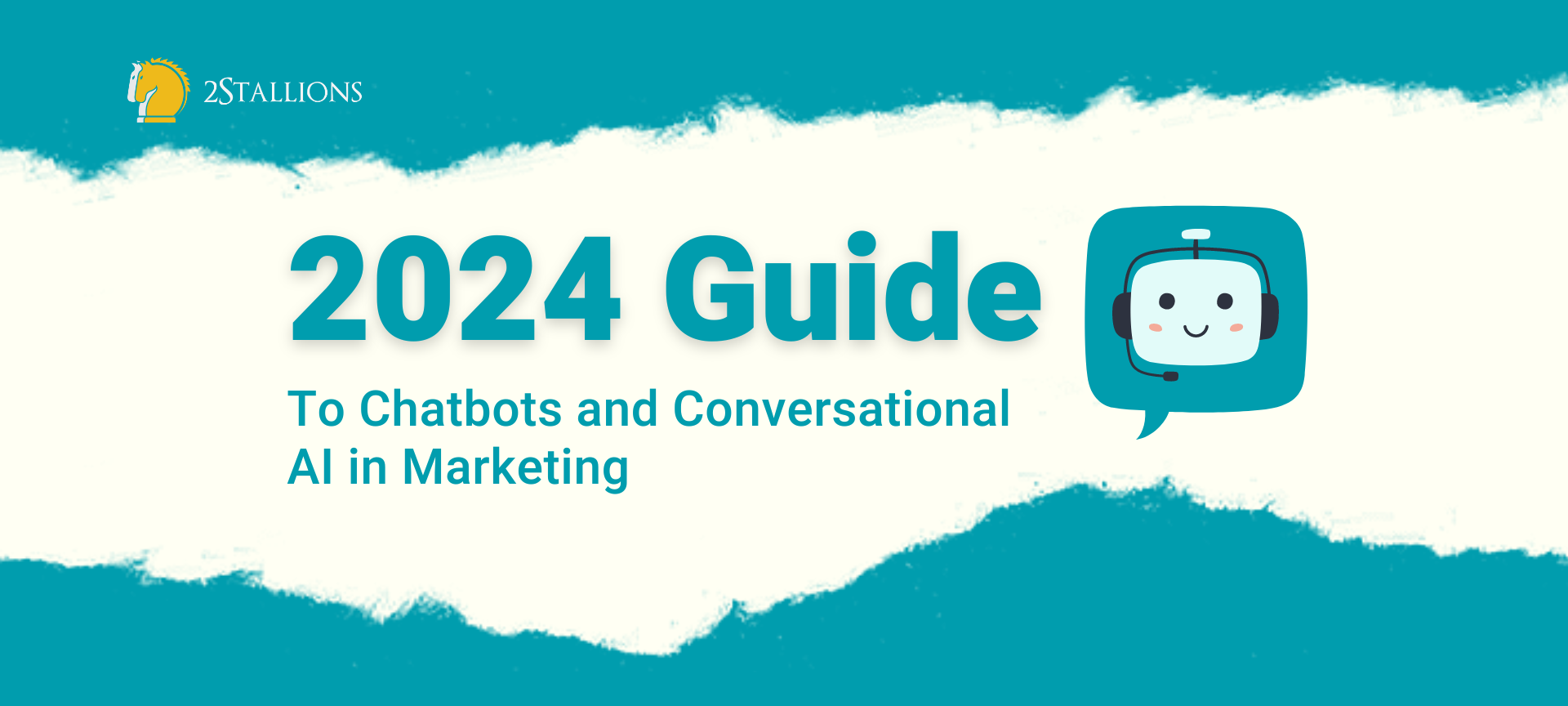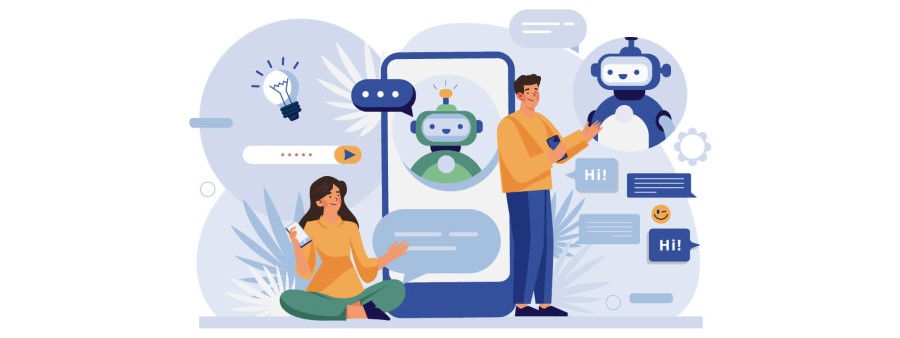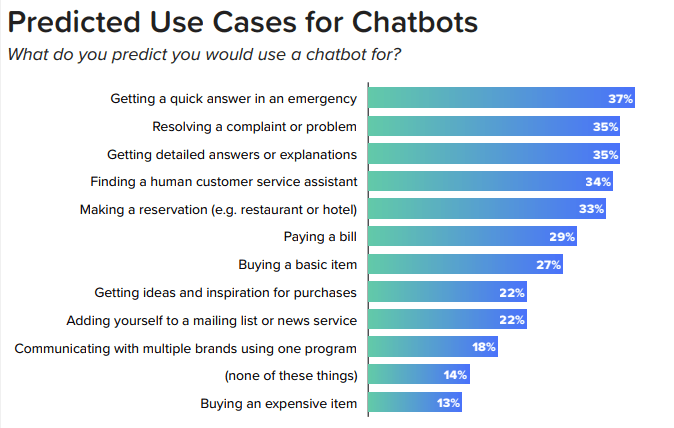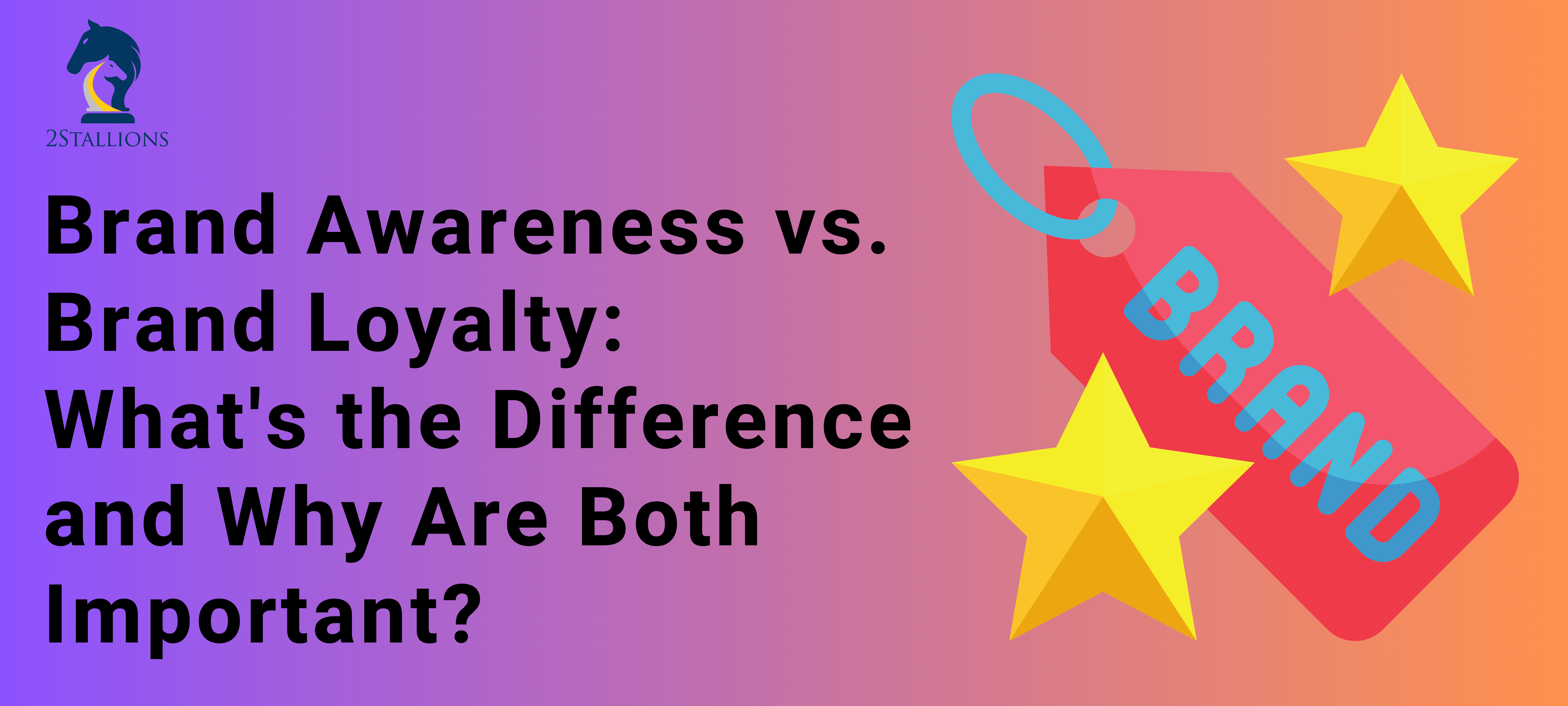SHARE

2024 Guide to Chatbots and Conversational AI in Marketing
In today’s digital age, businesses constantly seek innovative ways to engage with customers and enhance their marketing strategies. One such technology that has gained significant attention is chatbots and conversational AI. These intelligent virtual assistants have revolutionised how companies interact with their audience, providing personalised experiences and streamlining customer service.
(Source: https://images.app.goo.gl/4hdio25Hop6oLp4V7)
Understanding the Role of Chatbots and Conversational AI in Marketing
In this comprehensive guide, we will explore the role, evolution, transformation, future trends, and implementation of chatbots and conversational AI in marketing.
Defining Chatbots and Conversational AI
Before diving into the details, let’s briefly define what chatbots and conversational AI actually are. Chatbots are:
- AI-powered computer programs that simulate human conversation.
- Assisting users in finding information.
- Providing support.
- Even making purchases.
Conversational AI, on the other hand, encompasses a broader range of technologies and platforms that enable natural language processing and understanding, creating a more intuitive and human-like interaction. Chatbots have come a long way since their inception. Initially, they were simple rule-based systems that could only respond to a limited set of predefined questions. However, with advancements in machine learning and natural language processing, chatbots have become more sophisticated and capable of understanding and responding to various user queries. Conversational AI, as a field, has also evolved rapidly. It now includes technologies such as voice assistants, virtual agents, and even chatbot platforms that can be integrated into various communication channels like websites, messaging apps, and social media platforms.
The Importance of Chatbots and Conversational AI in Modern Marketing
Chatbots and conversational AI have become essential business tools in today’s fast-paced world, where customers have high expectations and limited attention spans. These technologies allow companies to engage with their audience in real-time, provide immediate responses, and deliver personalised experiences. Imagine a customer visiting an eCommerce website looking for a specific product. Instead of browsing through numerous pages or waiting for customer support, they can simply interact with a chatbot. The chatbot can understand their requirements, provide relevant product recommendations, and even assist with purchasing. This not only saves time for the customer but also enhances their overall shopping experience.
Moreover, chatbots and conversational AI enable businesses to gather valuable customer insights. Companies can understand customer preferences, pain points, and buying patterns by analysing the conversations and interactions. This data can then be used to refine marketing strategies, improve product offerings, and tailor promotions to specific customer segments. Another significant advantage of chatbots and conversational AI is their ability to provide round-the-clock support. Unlike human agents with limited working hours, chatbots can be available 24/7, ensuring that customers always have access to assistance whenever needed. This not only enhances customer satisfaction but also helps businesses in building a reputation for excellent customer service.
Furthermore, chatbots can be integrated with other marketing automation tools, such as email marketing platforms or CRM systems, to create a seamless and integrated customer journey. For example, a chatbot can collect customer information during a conversation and automatically update the CRM database, allowing businesses to track and nurture leads more effectively. Chatbots and conversational AI have revolutionised how businesses interact with their customers. By offering a seamless and convenient interaction, these technologies foster customer satisfaction, build brand loyalty, and drive business growth.
The Evolution of Chatbots and Conversational AI in Marketing
A Brief History of Chatbots and Conversational AI
Chatbots and conversational AI have come a long way since their inception. The history can be traced back to the early days of artificial intelligence research in the 1950s. However, it wasn’t until the 1990s that chatbots started to gain popularity with the advent of internet-based messaging platforms. Over time, natural language processing and machine learning advancements have significantly improved the capabilities and performance of chatbots and conversational AI.
Recent Advancements in Chatbot and AI Technology
With rapid technological progress, chatbots and conversational AI have witnessed remarkable advancements in recent years. These innovations have allowed businesses to provide faster, more accurate, and context-aware responses, from rule-based chatbots to more sophisticated AI-powered virtual assistants. Moreover, integrating advanced analytics tools has enabled chatbots to gather valuable customer data, facilitating targeted marketing campaigns and personalised recommendations.

How Chatbots and Conversational AI Are Transforming Marketing
Personalisation and Customer Engagement
One of the primary ways chatbots and conversational AI transform marketing is through personalisation. By analysing user data and preferences, these technologies can tailor their responses and recommendations to each individual. This level of personalisation enhances customer engagement, making them feel valued and understood. Whether assisting with product selection, answering queries, or offering relevant promotions, chatbots and conversational AI deliver customised experiences that drive customer satisfaction and loyalty.
Data Collection and Analysis
In addition to personalisation, chatbots and conversational AI also play a pivotal role in data collection and analysis. As customers interact with chatbots, valuable insights can be gathered, including their preferences, buying behaviour, and pain points. This data can then be leveraged to fine-tune marketing strategies, refine product offerings, and identify new opportunities. By analysing large volumes of conversational data, businesses gain a deeper understanding of their target audience, empowering more effective decision-making.
Sales and Lead Generation
Beyond engagement and insights, chatbots and conversational AI have the power to drive sales and generate leads. With their ability to provide instant responses and simulate guided selling experiences, these technologies remove friction from the customer journey, leading to higher conversion rates. Through dynamic product recommendations, real-time discounts, and personalised offers, chatbots and conversational AI guide potential customers towards purchasing, increasing sales opportunities and improving revenue streams.

(Source: https://www.revechat.com/blog/chatbots-trends-stats/)
Future Trends in Chatbots and Conversational AI for Marketing
Predicted Advancements in AI Technology
The future of chatbots and conversational AI in marketing looks promising, with several exciting advancements predicted. Improved natural language understanding, enhanced voice recognition, and sentiment analysis are some areas where AI technology is expected to progress significantly. Moreover, integrating machine learning algorithms and predictive analytics will enable chatbots and conversational AI to anticipate customer needs, delivering hyper-personalised experiences like never before.
The Future of Customer Service and Engagement
As technology evolves, chatbots and conversational AI will play an increasingly integral role in customer service and engagement. With innovations such as emotional intelligence and empathetic responses, these virtual assistants will become more adept at understanding and empathising with customer needs and emotions. Integrating chatbots across multiple platforms, including social media and voice assistants, will ensure seamless and consistent interactions, further enhancing customer satisfaction and loyalty.

(Source: https://verloop.io/blog/ai-chatbot/)
Implementing Chatbots and Conversational AI in Your Marketing Strategy
Choosing the Right Chatbot and AI Tools
When it comes to implementing chatbots and conversational AI in your marketing strategy, selecting the right tools is crucial. Consider factors such as the complexity of your needs, desired level of personalisation, and integration capabilities with existing systems. Choosing a tool that aligns with your specific requirements and provides the scalability to adapt to future advancements is essential.
Best Practices for Integrating Chatbots and AI Into Your Marketing Strategy
Integrating chatbots and conversational AI into your marketing strategy requires careful planning and execution. Tailoring the conversation flow to the customer journey is imperative, ensuring a seamless transition between human and chatbot interactions. Additionally, continuous monitoring and analysis of conversational data can provide insights for optimising the chatbot’s performance and identifying areas for improvement. Regularly updating and enhancing the chatbot’s knowledge base is essential to meet evolving customer needs.
Measuring the Success of Your Chatbot and AI Implementation
Defining clear metrics and goals is essential to gauge the success of your chatbot and AI implementation. Monitor key performance indicators such as customer satisfaction ratings, response time, resolution rates, and conversion rates. Gather customer feedback and regularly analyse data to identify areas where improvements can be made. By continuously refining and assessing the performance of your chatbot and AI, you can ensure optimal results and maximise your return on investment.
In conclusion, chatbots and conversational AI have emerged as powerful tools in modern marketing. Businesses can enhance customer engagement, gather valuable insights, and drive sales by understanding their role, evolution, transformation, and future trends and implementing them strategically. Embrace the potential of chatbots and conversational AI in your marketing strategy to stay ahead in the ever-evolving digital landscape.
Frequently Asked Questions About Chatbots and Conversational AI in Marketing
What Role Do Chatbots and Conversational AI Play in Marketing?
Chatbots and conversational AI play a crucial role in marketing by facilitating 24/7 customer service and personalised communication, automating lead generation, and enhancing user engagement through instant and interactive responses.
How Can Businesses Implement Chatbots and Conversational AI Effectively?
Businesses can implement these technologies effectively by defining clear objectives, ensuring seamless integration with existing systems, focusing on customer experience, and continuously analysing interactions for improvements.
What Are the Benefits of Using Chatbots and Conversational AI in Marketing?
The benefits include improved customer satisfaction, increased conversion rates, reduced operational costs, and the ability to gather valuable insights from customer interactions to inform marketing strategies.
What Advancements in Chatbots and Conversational AI Should Marketers Be Aware of in 2024?
Marketers should be aware of advancements such as more natural and nuanced language processing, integration of AI with omnichannel marketing strategies, and conversational AI for more personalised and context-aware interactions.









